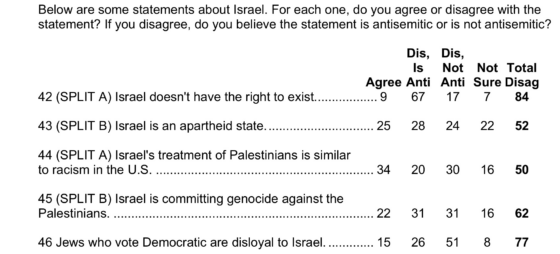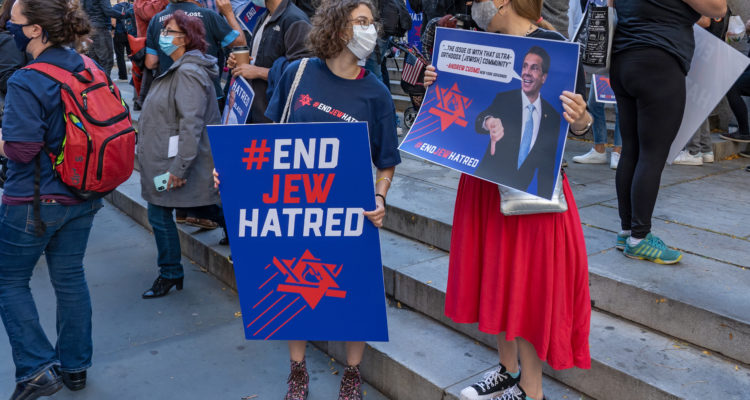A recent poll purports to capture the attitudes of American Jews regarding Israel and politics, but a closer look shows it was presented with a clear narrative arc designed to manipulate the respondents.
By Dr. Alex Joffe, BESA Center
Political polls have long been regarded as useful snapshots of belief and behavior, including among American Jews. A recent poll of American Jews, however, demonstrates yet again that polling is actually a tool for political and ideological manipulation.
The poll, conducted by the firm GBAO Strategies, purports to show, among other things, that 25% of American Jews see Israel as an “apartheid state” and that 22% agree that “Israel is committing genocide against the Palestinians.” These results have set off a predictable firestorm of hand-wringing, especially among Jews on the left.
The design of the poll can be addressed quickly. It claims to have surveyed 800 American Jews. Its breakdown of 37% Reform Jews, 31% Jews of no particular denomination, 17% Conservative, and only 9% Orthodox, while representing a fair breakdown of the Jewish community as it exists in the US, is a deliberate under-sampling of the sector of the community inclined to both support Israel and have children. It thus represents the present, not the future.
The wording of the questions is another sign of the poll’s tendentious nature. The first substantive question asks, “Below is a list of issues facing our country today. Please mark which TWO of these issues you want President Joe Biden and Congress to focus on.” Not unexpectedly, given the sample of Jews polled, the two highest-ranked issues are climate change and voting rights. Jobs and the economy came in third while immigration was ranked seventh. Israel was 13th while Iran was 14th.
This result can only be explicable in terms of a survey designed to elicit certain results from a sample that is already predisposed to be less interested in Israel than in domestic issues. Indeed, 67% of the respondents admit to having voted for Biden, with 80% giving him an “approve” rating.
The Israel questions are cleverly structured, with positive and negative questions alternating. Some 62% of respondents declare themselves “attached” to Israel but only 29% “strongly attached.” This question leads into the next—“People often talk about being ‘pro-Israel.’ Do you think someone can be critical of Israeli government policies and still be ‘pro-Israel?’”—which is obviously designed to legitimize undefined “criticism.” That is then followed by a question about the importance of “financial aid” to Israel. This allowed readers to absorb the good news that 71% of respondents think “financial aid” is important.
The questions then guide the reader to certain other conclusions: that 58% support conditions such that “Israel cannot spend US aid on expanding settlements in the West Bank,” that 62% support restoring aid to the Palestinians, and that 61% support a two-state solution. Revealingly, the respondents are unsure whether the new Bennett-Lapid government will strengthen or weaken US-Israel relations.
But this narrative arc is interrupted by the blatant insertion of starkly worded questions that cast Biden and Trump as polarities, such as “whether you trust Joe Biden or Donald Trump to do a better job with this issue.” With this framing, is it surprising that Biden is the hands-down winner on fighting antisemitism, handling the Israeli-Palestinian issue, and Iran? Similar questions also put the Democratic Party as the winner on the “trust” issue. The poll then veers tellingly into the issue of US voting rights and electoral laws, unsubtly joining the Middle East, Biden, and elections as a seamless whole.
The most preposterous results are left for last. Respondents report being very concerned about antisemitism in America—with 61% describing it as a right-wing phenomenon, as opposed to 22% seeing the threat from the left. Some 38% report feeling “more safe” “as a Jewish person living in America” than living in Israel, while 42% say (curiously) that there is no difference.
The questions that attracted the most attention were relegated to the end of the poll, either in order to hide them or as a way of ending with a bombshell. These should be allowed to speak for themselves:

Is this a fair representation of the American Jewish community? Maybe, maybe not. Is it a form of political manipulation? Obviously.
More important than the results is who undertook the poll and why. Several commentators have pointed out that the poll was conducted for the “Jewish Electorate Institute” by GBAO Strategies, a firm specializing in consulting for “Democratic candidates for office to socially conscious small businesses and Fortune 500 companies, labor unions and progressive ballot initiative campaigns to world famous cultural institutions, think tanks to advocacy groups and civic organizations.”
The firm has consulted for J Street, the New Israel Fund, and the Center for Middle East Peace and Economic Cooperation (which was formerly run by GBAO Strategies principal and Ehud Barak consultant Jim Gerstein), as well as a slew of left-wing organizations dealing with abortion, “green” issues, teachers’ unions, and a host of other progressive causes. In short, it is part of the Democratic Party echo chamber in Washington.
This extends to the Jewish Electorate Institute (created in 2018), which is run by Washington DC-area Jewish professionals including several who have had roles at the highest levels of American Jewish communal life. Most are long associated with the Democratic Party, including Executive Director Halie Soifer, who for some reason is not listed on their website but is noted as the principal officer on the organization’s tax–exempt status application.
Not coincidentally, Soifer, a former Obama administration official who also worked for now-VP Kamala Harris, is CEO of the Jewish Democratic Council of America. This organization touted the Jewish Electorate Institute poll for showing “why the past four years have only solidified the Democratic Party as the political home of American Jews. American Jews overwhelmingly identify as pro-Israel, liberal Democrats, and 80% of Jewish voters support the job Joe Biden is doing as president.”
Again not coincidentally, the two organizations share the same address (1440 G Street, NW, Washington, DC, 20005).
The Obama administration pioneered the creation of the progressive echo chamber with ostensibly independent think tanks and communal organizations, such as J Street and NIAC, all of which were tied to prominent Democratic donors and dark money sources. The goal was to shape the information environment by regurgitating administration talking points through studies and legitimizing them through polls. The Jewish Electorate Institute is another iteration.
Information operations against fellow Americans are unseemly under any circumstances, but for Jews to be gaslighting other Jews on behalf of Democrats is despicable. That said, regardless of the precise numbers, the poll does represent some aspect of reality: an alienation from Israel on the part of a sector of Conservative and Reform Jews, particularly the younger generation. This deserves fuller analysis.
But the willingness to even entertain the word “genocide” in a poll when it comes to the Palestinians, much less endorse it, is telling. It reflects a pervasive failure of education, both Jewish and secular—but more importantly, a subordination of critical thinking to memes and sound bites designed to sway emotions and goad people into compliance. The poll has unwittingly revealed yet again the fealty of many American Jews and their high-sounding organizations to the Democratic Party, but also their dangerous intellectual vacuity.
Alex Joffe is a senior non-resident fellow at the BESA Center.




